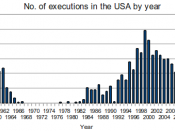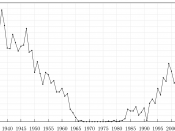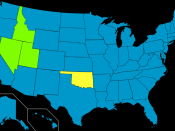Capital Punishment: The Other Side Capital punishment in America has been portrayed in the past as a just and equal punishment for the crime that was committed, such as murder. I feel that capital punishment is an act of revenge. Many times in our society people are quick to judge, and this does not exclude a jury. Only in a handful of cases has capital punishment been an acceptable means of judgment. Capital punishment only demonstrates retribution and provides little or no deterrence for crime, and in many cases, is biased and unconstitutional, which is why the death penalty should be abolished. The family of a murdered victim wants the offender to pay for his/her crime. The death penalty offers closure to the victim to know that no matter what happens this killer will never kill again. Is this not retribution or an eye for an eye? The family would have a greater sense of revenge knowing the culprit is in jail forever than if he/she was put to death.
The criminal suffers from knowing how much time he has left to be alive, but he/she will have no long time suffering like the family of the victim will experience. One would think that if a man spent his remaining time on this earth in a jail cell, to think and rethink his/her crime would be a sufficient and just punishment. Capital punishment is only satisfying the revenge, which is a primitive feeling beyond which our society should have progressed. Death is the easy way out for the criminal. In reality, it is a case of revenge.
Capital punishment has been proven to have no deterrence on people who commit these heinous crimes. If this were to be proven, people would not commit murder for fear of their own life. In Congregation of the Condemned, Shirley Dicks, a law professor at New York University, claims," Murderers do not expect to be caught or to be sentenced to death, so the threat of the death penalty has no deterrent effect on them" (17). Dicks brings up a very good point; the repercussions never cross the mind of a criminal. When a criminal is finally caught, only then does he/she think of the repercussions. If deterrence were a factor, the United States would see a dramatic decline in capital murder. Putting a man or woman to death does not have an impact on the mind of a criminal. However, the death penalty is justified in our court system. In his book, Capital Punishment Under Fire, Bowers, a law professor at Northeastern University, states, " Unlike all other legally justifiable killings, the execution is a purposeful and prearranged homicide" (62). Bowers also states "people will argue that the fundamental impact of the death penalty is to reduce respect for human life in society, rather than to increase abhorrence for murder and like offenses" (Capital Punishment Under Fire 63). The death penalty does not discourage atrocious crime it only creates repugnance throughout society.
Many reports have been produced to show statistics in cases where innocence was found after they were put to death. The most popular of these reports is the Bedau-Radelet report. In this report on "Miscarriages of Justice in Potentially Capital Cases", " it was reported that 350 people have been wrongfully sentenced, twenty-three of which were actually killed by the state before they were found to have been innocent" (qtd. in Congregation of the Condemned 16). This number may seem low, but it shows that innocent people have been legally murdered. Does this seem constitutional? There are many organizations in the United States that have risen up and taken a stand on this issue. For example, the National Coalition To Abolish The Death Penalty (NCADP) was started in 1976 and has been "the only fully staffed national organization exclusively devoted to abolishing capital punishment" (). Another group that has taken a stand is the Campaign to End The Death Penalty (CEDP). This group, which is based out of Maryland, has fought diligently to abolish the death penalty. Their slogan, "Abolish the Racist Death Penalty," has encouraged several states in the Union, some of which whom have done away with the death penalty, to enforce a more humane sentencing (). Abolishing the penalty could save the lives of men who have been wrongfully found guilty and sentenced.
Some of these people who are charged with a capital crime may not have the financial means to afford a good criminal defense attorney. Dicks says, "People have been sentenced to death and executed, not because they have been found to be uncontrollably violent, but because they are hopelessly poor" (Congregation of the Condemned 16). How many of these people were innocent? The NCADP states, "95 percent of the over 3700 people under death sentence could not afford a private attorney." "These numbers are tainted with racial and class bias, and over 55 percent of these people were from a variety of ethnic backgrounds" (). It is in the best interests of the accused to be treated fairly despite the color of his/her skin. A person is innocent until proven guilty, but once that person walks into the courtroom, the jurors judge the skin color rather than judge the crime. Not only is this done out of hatred, it is done with ignorance and malice. Jurors who have passed judgment are no guiltier than the person standing trial.
If a person commits a crime he/she should pay for that crime. A life sentence is better than the person being put to death. With the possibility of an innocent man being sentenced to death is not only unfair but also unconstitutional. Since the death penalty only demonstrates revenge, is biased, and provides no deterrence for crime, there is no good that can come out of this type of reprimand. Capital punishment is irrevocable and fallible and should be abolished.





